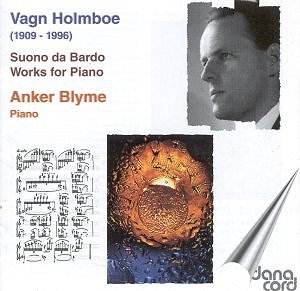Holmboe's musical output was prodigious. As time passes
I am getting a better perspective on it.
The symphonies, concertos and string quartets, all
of which have been recorded, are central and many are essential. Amongst
these works, even now, we recognise pieces that have a real prospect
of a concert life. Others may have to wait in the same way that Bach
had to wait for Mendelssohn. Of the works with durability and resilience,
the core symphonies (4 to 8) stand at the apex.
In his typically helpful notes for this CD Mogens Wenzel
Andreasen leads us gently through the facts and opinions. He makes the
point that Holmboe was not greatly active as a composer for solo piano.
Of those works that were written many were for the Romanian born pianist
Meta Graf, who, in 1933, he was to marry. Graf and Holmboe trekked the
Rumanian countryside collecting folksongs during the 1930s.
The wartime Briosa is still in manuscript as
is so much of Holmboe's piano music. Its first movement clangs along
in malignant spirit like the dance of an iron witch - a surprise for
the first movement of a so-called happy sonata. The final movement is
similarly remorseless. These flank an uncomplicated 'raindrop' Allegretto
placido. The four movement Suite is from Christmas 1931 and
is dedicated to the composer's wife to be. The work has a spring morning
simplicity (akin to the carefree piano works of John Ireland) but viewed
through a charcoal stained distorting mirror. The Small Piano Pieces
(7) are brief splinters of inspiration - a sort of Nordic Mikrokosmos
with hints of Haydn and Beethoven along the way. Some are clearly
inspired by naïve ideas and childlike innocence. Others have a
broader range of feeling such as the Bach-like Andante. The Rumanian
Suite is a legacy of the young couple's tramp through Rumania. The
gypsy fiddle, the rustic hurdy-gurdy and the crystal 'steps' of the
cimbalom are all there. The characteristic curve and sinuous twist of
Balkan folk music is everywhere. The work would be difficult to identify
as Holnboe's - at least at surface level and would make an excellent
'innocent ear' test.
Finally we come to the five movement Suono da Bardo.
This is the major work on this disc both in mien and in duration.
Running to almost 35 minutes it takes up more than half the playing
time. The Sound of the Bard evokes the dark woodlands and caves
of the psyche. You might well suspect that the crystalline treble work
of the right-hand is suggestive of the same bardic harp that haunts
Sibelius's own Bard - his bleakest tone poem closer to the spareness
of Luonnotar and the Fourth Symphony than to any of his other
works. However Sibelius's Bard is warm by comparison with the
Holmboe. The Suono da Bardo is dissonant without confusion; vinegary
but not exactly sour either. Lucidity in expression is valued by Holmboe.
The music certainly has linkages with Bartók but also present
are unknowing glances towards works Holmboe could not have known such
as the sonatas of Elie Siegmeister and Frank Bridge. We should note
the oxymoronic sub-title - one which was used by Nielsen in his piano
works (also recorded on Danacord by Mina Miller). The work is coherent,
emotionally speaking, (do not expect anything carefree). It develops
its journey by the same process of transformation favoured by Liszt
and also by Holmboe's great contemporary Niels Viggo Bentzon. The closing
pages lead you out from darkness into light.
Excellent performances by veteran pianist Anker Blyme
and recording quality to match.
Rob Barnett
CONTACT
www.danacord.dk


